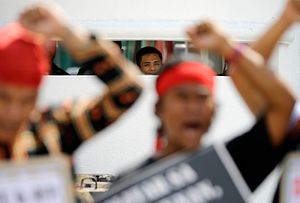International Indigenous Peoples (IP) group and several IP organizations from the Philippines marshaled at the Manila Regional Trial Court (RTC) on August 31 to rally for the dismissal of the Department of Justice (DOJ) proscription list that labels indigenous leaders as “terrorists.” The gathered groups also filed a motion to clear the names of indigenous leaders.
The International Indigenous Peoples Movement for Self-determination (IPMSDL) joined the protest action along with Cordillera Peoples Alliance (CPA), Katribu Kalipunan ng Katutubong Mamamayan ng Pilipinas (Katribu), Philippine Task Force for Indigenous Peoples Rights (TFIP), and BAI Indigenous Women’s Network. The protest was mobilized in time for the submission of a motion and court hearing for the terrorist-tagging case, which includes IPMSDL’s Global Coordinator Beverly Longid. The proscription petition filed by the DOJ, which seeks to declare the Communist Party of the Philippines–New People’s Army (CPP-NPA) a terror group, also includes 649 names of alleged CPP-NPA leaders and members. It was filed in the Manila RTC on February 21 following President Rodrigo Duterte’s Proclamation 374 and Human Security Act (HSA) 2007.
Last August, the Manila RTC cleared the names of Satur Ocampo, Rafael Baylosis, Jose Melencio Molintas, and United Nations (UN) Special Rapporteur Victoria Tauli-Corpuz. In the same month, the DOJ admitted in a congress budget hearing that it did not verify the 649 names, many of which are aliases and code names, as supplied by the intelligence of Armed Forces of the Philippines and Philippine National Police.
“There’s an irresponsibility in the part of DOJ for just listing names of activists and tagging them as terrorists without even submitting an iota of evidence to prove the that the names in the Petition for Proscription is involved with CPP and NPA,” said Attorney Pablo Sanidad II, Longid’s legal counsel.
The motion to delist the names states that the HSA 2007 may only be applied to organizations and not individuals, and that the DOJ has not given any summon or any substantial evidence. The delistment of the earlier four names were also on the same grounds as ruled by the court.
“The national and international track record of Longid and all the IP leaders included as an advocate for the recognition and promotion of IP rights and welfare clearly shows that they are not terrorist or anything that the government says they are,” Sanidad II added. “And we pray that the court stands for its duty to protect the rights of rights defenders.”
Longid said, “The state harassment and attacks on activists, human rights defenders, and IP leaders every time they step up their struggle for social change, for the protection of their lands and rights, and against destructive extractive projects and plunder of their ancestral territories shows this systematic targeting of those who rightfully criticize the government policies or corporate businesses. And given the track that President Duterte is treading, this will continue and intensify.”
Since Duterte’s presidency began in 2016, reports of political attacks, civil rights and human rights violations and abuses against IP have been documented. As of February 2018, 178 IP have been illegally arrested based on the monitoring of Katribu Kalipunan ng Katutubong Mamamayan ng Pilipinas. Cases of military, paramilitary, and police vilification of IP organizations in Cordillera, fabricated criminal charges against Lumad groups’ council members in Mindanao, forced surrenders of Dumagat IP in Quezon Province after being tortured and threatened, and many others killed and assassinated, have been filed on Commission of Human Rights and state offices.
“The increasing records of gross human rights violations under the state’s counterinsurgency Oplan Kapayapaan and extension of Martial Law in Mindanao is consistent with the global crisis involving legal maneuverings and government policies that favors big businesses and victimize IP communities,” Longid said. The criminalization of IP and land defenders opposing the transformation of ancestral lands into mono-crop plantations, mining and energy projects, and eco-tourism destination smears their reputation and makes them vulnerable targets, as in similar cases in Guatemala, Brazil, India, Columbia, and Africa.
Recently, the Department of Environment and Natural Resources (DENR) announced that it will open more “areas of mineral reservations” to attract mining companies and pump government income. “It’s not surprising that these areas are also ancestral lands and villages of IP, and also the areas heavily concentrated with military forces and wanton records of human rights violations,” Longid added.
“But it is during these dangerous times when people’s unity and solidarity grow stronger. The people’s movement against the human rights violations of state forces and officials, and against the plunder and dispossession of ancestral lands expands and intensifies to defeat the oppressors,” she said. Several local councils and organizations have submitted petitions to delist the names in the proscription.
A “letter of concern on the increasing harassment and intimidation of indigenous peoples’ leaders and human rights defenders” was endorsed by 16 international organizations and 205 national organizations from 38 other countries from different global regions. An online petition was signed by more than 11,200 individuals from 113 countries.
Paul Joseph Belisario is a communications officer for International IPMSDL and ILPS Commission 10.
































